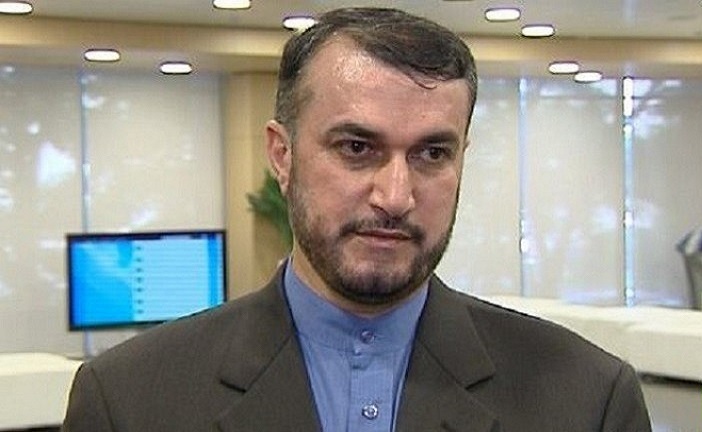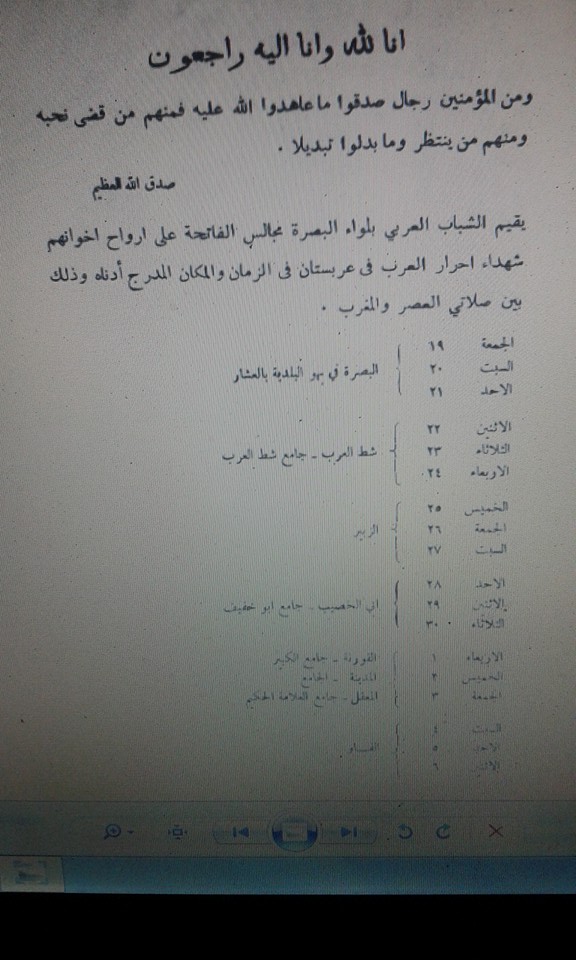DOCUMENT – IRAN: TWO AHWAZI ARAB MEN RISK IMMINENT EXECUTION
UA: 72/14 Index: 13/014/2014 Iran Date: 26 March 2014
URGENT ACTION
TWO AHWAZI ARAB MEN RISK IMMINENT EXECUTION
Two Ahwazi Arab men on death row, Ali Chebieshat and Sayed Khaled Mousawi, have been transferred from Fajr Prison in Dezfoul, Khuzestan province, to an unknown location, sparking fears their execution may be imminent.
The family members of Ali Chebieshat and Sayed Khaled Mousawi, both members of Iran’s Ahwazi Arab minority, were told on 18 March by prison officials that Ministry of Intelligence officials had transferred the men from the prison to an unknown location. They may be at imminent risk of execution given that two other Ahwazi Arab men were secretly executed in January 2014 after their transfer to an unknown location.
Ali Chebieshat and Sayed Khaled Mousawi were sentenced to death on 9 September 2013 by Branch Two of the Revolutionary Court in Ahvaz on the charge of “enmity against God” (moharebeh) in relation to the explosion of a natural gas pipeline close to their native village in Khuzestan. The court sentenced a third man, Salman Chayani, to 25 years’ imprisonment to be served in internal exile in Yazd, central Iran.
All three men had been arrested on 10 November 2012 along with a number of others and taken to a Ministry of Intelligence detention centre in Ahvaz. They were reportedly denied access to lawyers and their families for the first several months of their detention and are believed to have been tortured or otherwise ill-treated. They were shown “confessing” to their role in the explosion of the gas pipeline on an Iranian state television channel in June 2013, in violation of international standards for fair trials. They have appealed against their death sentences, which are still under consideration by the Supreme Court.
Please write immediately in Persian, English or your own language:
Urging the authorities not to execute Ali Chebieshat and Sayed Khaled Mousawi and to immediately disclose their whereabouts;
Urging them to investigate the allegations that the men were tortured or otherwise ill-treated and ensure that “confessions” obtained under torture are not used as evidence in court;
Calling on them to ensure the men are protected from torture and other ill-treatment, are granted any medical attention they may require and are allowed regular contact with their lawyers and families;
Reminding them that under international law, the death penalty may only be used for “the most serious crimes”, which international bodies have interpreted as being limited to crimes involving intentional killing.
PLEASE SEND APPEALS BEFORE 7 MAY 2014 TO:
Leader of the Islamic Republic
Ayatollah Sayed ‘Ali Khamenei
The Office of the Supreme Leader
Islamic Republic Street – End of Shahid
KeshvarDoust Street,
Tehran, Islamic Republic of Iran
Twitter: @khamenei_ir
Email: info_leader@leader.ir
Salutation: Your Excellency
Head of the Judiciary
Ayatollah SadeghLarijani
c/o Public Relations Office
Number 4, 2 Azizi Street intersection
Tehran, Islamic Republic of Iran
(Subject line: FAO
Ayatollah Sadegh Larijani)
Salutation: Your Excellency
And copies to:
President of the Islamic Republic of Iran
Hassan Rouhani
The Presidency
Pasteur Street, Pasteur Square
Tehran, Islamic Republic of Iran
Email: media@rouhani.ir
Twitter: @HassanRouhani (English) and
@Rouhani_ir (Persian)�
Also send copies to diplomatic representatives accredited to your country. Please insert local diplomatic addresses below:
Name Address 1 Address 2 Address 3 Fax Fax number Email Email address Salutation Salutation
Please check with your section office if sending appeals after the above date.
URGENT ACTION
TWO AHWAZI ARAB MEN RISK IMMINENT EXECUTION
ADDITIONAL INFORMATION
Ali Chebieshat, Sayed Khaled Mousawi and Salman Chayani were arrested on 10 November 2012 in Khuzestan Province, along with a number of other men, in their village, near the city of Shush. The security forces are understood to have surrounded the house of Ali Chebieshat’s mother where a private ceremony was being held. They showed no arrest warrant and did not say why they were arresting the men. All the others arrested were later released on bail.
The security forces held the men in a Ministry of Intelligence detention centre in Ahvaz where they had no access to lawyers or their relatives for several months. They were allegedly tortured and were forced to make videotaped “confessions”. The men were seen on state TV “confessing” and taking responsibility for the explosion in October 2012 of the gas pipeline near their village, first in June 2013 and later in November 2013.
In June or July 2013, Ministry of Intelligence officials told the men’s families that they could meet with the detainees in a mosque in the village of Jarieh. When they arrived at the mosque, the families realized that the room was equipped with cameras. Amnesty International understands that they were told that if they agreed to be filmed while watching their relatives’ recorded “confessions”, the authorities would consider reducing the punishments of the detainees. They were not told that the recorded footage would be aired on national TV. Ali Chebieshat’s family members, who refused to be filmed, were apparently contacted by Ministry of Intelligence officials a few months later and coerced into being filmed or risk the execution of their relative. In November 2013, two state-sponsored TV channels aired a “documentary” called Lost in Darkness in which they showed the forced “confessions” of Ali Chebieshat, Sayed Khaled Mousawi and Salman Chayani and the footage of the family members.
Two other Ahwazi Arab men, Hadi Rashedi and Hashem Sha’bani Nejad (referred to in previous UAs as Hashem Sha’bani Amouri), were executed in secret at the end of January 2014. Their families were told by an official from the Ministry of Intelligence on 29 January that the two men had been executed and buried a few days earlier. Amnesty International understands that the men’s families were not told the exact date of the executions, either in advance or after they had taken place, and have not received the bodies of their relatives. The official told the families they were not permitted to hold a public memorial for the two men and had only 24 hours in which to hold a private service. Three other Ahwazi Arab men, Mohammad Ali Amouri, Sayed Jaber Alboshoka and Sayed Mokhtar Alboshoka, who had been sentenced to death along with them, remain at risk of execution.
Under Article 38 of the Iranian Constitution and Article 9 of the Law on Respect for Legitimate Freedoms and Safeguarding Citizens’ Rights, all forms of torture for the purpose of obtaining “confessions” are prohibited. Iran’s Penal Code also provides for the punishment of officials who torture citizens in order to obtain “confessions”. However, despite these legal and constitutional guarantees regarding the inadmissibility of testimony, oath or confession taken under duress, forced “confessions” are sometimes broadcast on television even before the trial has begun and are frequently accepted as evidence in Iranian courts. Such broadcasts violate Iran’s fair trial obligations under Article 14 of the International Covenant on Civil and Political Rights, to which it is a state party, including the presumption of innocence.
Names: Ali Chebieshat, Sayed Khaled Mousawi, Salman Chayani
Gender m/f: m
Amnesty International: IRAN: TWO AHWAZI ARAB MEN RISK IMMINENT EXECUTION
HOWZ: IRAN: TWO AHWAZI ARAB MEN RISK IMMINENT EXECUTION





